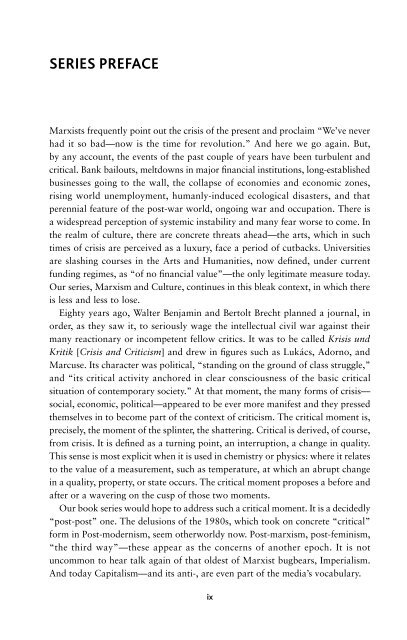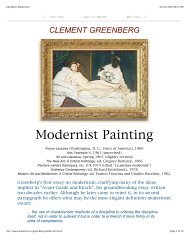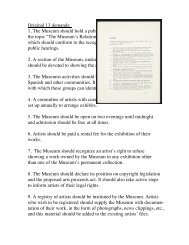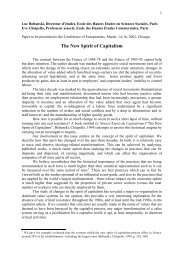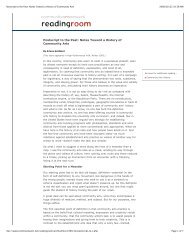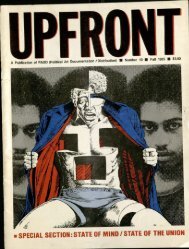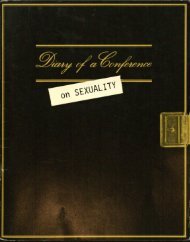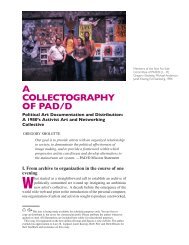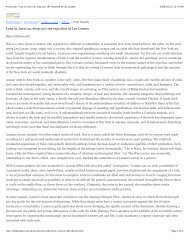- Page 2 and 3: Dark Matter
- Page 4 and 5: Dark MatterArt and Politics in the
- Page 6: This book is dedicated to Lucy R. L
- Page 12 and 13: AcknowledgmentsA substantial roster
- Page 14 and 15: Exordium: An Accidental RemainderMa
- Page 16: exordium: an accidental remainderxv
- Page 19 and 20: 2 Dark matterThe first newsletter o
- Page 21 and 22: 4 Dark matteressays that make up th
- Page 23 and 24: 6 Dark matterto separate art from n
- Page 25 and 26: 8 Dark mattera recall to the opport
- Page 27 and 28: 10 Dark matterNew York Newsday, Jun
- Page 29 and 30: 12 Dark matterincludes media pranks
- Page 31 and 32: 14 Dark mattercultural and ethnic i
- Page 33 and 34: 16 Dark matterCleaver, Mariarosa Da
- Page 35 and 36: 18 Dark matterGraphic designer and
- Page 37 and 38: 20 Dark matterof enterprise culture
- Page 39 and 40: 22 Dark matterof Vimercate, agreein
- Page 41 and 42: 24 Dark matterPicasso’s monumenta
- Page 43 and 44: 26 Dark matterthe early 1980s permi
- Page 45 and 46: 28 Dark matterexhibitions for each
- Page 47 and 48: 30 Dark matterthough intentional no
- Page 49 and 50: 32 Dark matterand affects. For no m
- Page 51 and 52: 34 Dark matterin great or immediate
- Page 53 and 54: 36 Dark matternarratives form “on
- Page 55 and 56: 38 Dark matterand early 1970s, when
- Page 57 and 58: 40 Dark matterhad approved legislat
- Page 59 and 60:
42 Dark matterspace was located. Th
- Page 61 and 62:
44 Dark matteris strictly hierarchi
- Page 63 and 64:
2The Grin of the ArchiveHaunting im
- Page 65 and 66:
48 Dark matterlands and commons in
- Page 67 and 68:
50 Dark matterTwo of the sketches m
- Page 69 and 70:
52 Dark matterHowever, it was the s
- Page 71 and 72:
54 Dark matterMadame Binh Graphics
- Page 73 and 74:
56 Dark matterfirst time. In an imp
- Page 75 and 76:
58 Dark matterMaterial in the PAD/D
- Page 77 and 78:
60 Dark mattermodeled on the popula
- Page 79 and 80:
62 Dark matterthe early to mid 1980
- Page 81 and 82:
64 Dark matterpublic resources away
- Page 83 and 84:
66 Dark matterA photocopied collage
- Page 85 and 86:
68 Dark matterand, somewhat prophet
- Page 87 and 88:
70 Dark matteralluding to a far lar
- Page 89 and 90:
72 Dark matter1994 REPOhistory stre
- Page 91 and 92:
74 Dark matterprojects were not onl
- Page 93 and 94:
76 Dark matterestate deals, conditi
- Page 95 and 96:
78 Dark matter“Oasis” where hig
- Page 97 and 98:
80 Dark matterof real estate develo
- Page 99 and 100:
82 Dark matterAppropriating museum
- Page 101 and 102:
84 Dark mattersubversive intent of
- Page 103 and 104:
86 Dark matternomadic artist ethnog
- Page 105 and 106:
88 Dark matterbroadcast their polit
- Page 107 and 108:
90 Dark matteroffering the text of
- Page 109 and 110:
92 Dark matterHomosexuals, he write
- Page 111 and 112:
4Temporary ServicesBecause you can
- Page 113 and 114:
96 Dark matterTwitter, Flickr, Word
- Page 115 and 116:
98 Dark matter“Roots” is one of
- Page 117 and 118:
100 Dark matterpractice such dark m
- Page 119 and 120:
102 Dark matterconceptual artist Do
- Page 121 and 122:
104 Dark matterdemands of flexible
- Page 123 and 124:
106 Dark matterquestionnaires that
- Page 125 and 126:
108 Dark matteradvertisements, popu
- Page 127 and 128:
110 Dark matterthe border or across
- Page 129 and 130:
112 Dark mattervisit to the webpage
- Page 131 and 132:
114 Dark matterBlack molasses is sp
- Page 133 and 134:
5Glut, Overproduction, Redundancy!W
- Page 135 and 136:
118 Dark matterOverproductionThat t
- Page 137 and 138:
120 Dark matteris to say that even
- Page 139 and 140:
122 Dark matterin the institutional
- Page 141 and 142:
124 Dark matterdesire is enhanced t
- Page 143 and 144:
126 Dark matterhours of work), and
- Page 145 and 146:
128 Dark matterAWC v. APTOne exampl
- Page 147 and 148:
130 Dark matterAs just noted, one o
- Page 149 and 150:
132 Dark matterStill from the video
- Page 151 and 152:
134 Dark matterWithout losing site
- Page 153 and 154:
136 Dark mattertook place across th
- Page 155 and 156:
138 Dark mattermonopoly on future a
- Page 157 and 158:
140 Dark matterStills from Evidence
- Page 159 and 160:
142 Dark matterto US intervention i
- Page 161 and 162:
144 Dark matterMembers of the inter
- Page 163 and 164:
146 Dark matterexplain why, despite
- Page 165 and 166:
148 Dark matterlonger attaches itse
- Page 167 and 168:
150 Dark matterrevenge of the exclu
- Page 169 and 170:
7MockstitutionsThe Cartographers Gu
- Page 171 and 172:
154 Dark matterby highways, onramps
- Page 173 and 174:
156 Dark matterof wonders veracity
- Page 175 and 176:
158 Dark matterbecame more pronounc
- Page 177 and 178:
160 Dark matterpair of cheeky, subu
- Page 179 and 180:
162 Dark matterappears in the index
- Page 181 and 182:
164 Dark matter• META-COMMERCIALS
- Page 183 and 184:
166 Dark matterrole of service pers
- Page 185 and 186:
168 Dark mattergroups to commandeer
- Page 187 and 188:
170 Dark matterWhat has been born o
- Page 189 and 190:
172 Dark matterThis relationship is
- Page 191 and 192:
174 Dark matterKlutsis, and Malevic
- Page 193 and 194:
176 Dark matterCampbaltimore. Their
- Page 195 and 196:
178 Dark mattergroup to full-blown
- Page 197 and 198:
180 Dark matterLearning Site’s
- Page 199 and 200:
182 Dark matterseminars. Once enoug
- Page 201 and 202:
184 Dark matteris to use the cultur
- Page 203 and 204:
8Conclusions: Nights of AmateursIn
- Page 205 and 206:
188 Dark matterkicks, an artist who
- Page 207 and 208:
NotesIntroduction1. Walter Benjamin
- Page 209 and 210:
notes 19116 Beaver Street, Lize Mog
- Page 211 and 212:
notes 19316. Allegedly, the popular
- Page 213 and 214:
notes 195Julie Ault, ed., Alternati
- Page 215 and 216:
notes 19724. An index to the PAD/D
- Page 217 and 218:
notes 199Art set within a broader c
- Page 219 and 220:
notes 20122. See Katharyne Mitchell
- Page 221 and 222:
notes 203Chapter 41. Yomango, “10
- Page 223 and 224:
notes 205Czechoslovak Revolution Co
- Page 225 and 226:
notes 20711. Marcelo Expósito, “
- Page 227 and 228:
notes 20947. Barbara Adam and Joost
- Page 229 and 230:
notes 21121. Lovink and Garcia, “
- Page 231 and 232:
notes 21311. See the Central Office
- Page 233 and 234:
notes 21543. Incarceration rates fo
- Page 235 and 236:
notes 217of educational seminars at
- Page 237 and 238:
ibliography 219Dan Peterman: 7 Dead
- Page 239 and 240:
ibliography 221Rosler, Martha and B
- Page 241 and 242:
appendix 223• Do you have a desig
- Page 243 and 244:
index 225Artists Meeting for Cultur
- Page 245 and 246:
index 227Center for Land Use Interp
- Page 247 and 248:
index 229Duncan, Carol, 6, 11, 56,
- Page 249 and 250:
index 231Haacke, Hans, 17, 42, 53,
- Page 251 and 252:
index 233flexible labor, productivi
- Page 253 and 254:
index 235new economy (Clinton), 38,
- Page 255 and 256:
index 237Puerto Rican activism and
- Page 257 and 258:
index 239army of unemployed or semi


